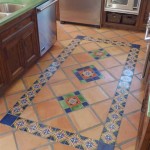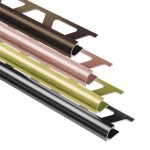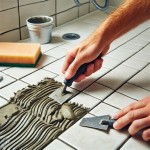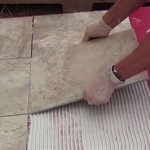Can You Use Floor Tile On Walls Of Shower Panels? A Comprehensive Guide
The question of whether floor tiles can be used on shower walls is a common one among homeowners undertaking bathroom renovation projects. While it might seem like a cost-effective or aesthetically appealing option, it's crucial to understand the technical considerations, potential drawbacks, and best practices before making such a decision. This article delves into the factors that determine the suitability of using floor tiles on shower walls, providing a comprehensive guide for making an informed choice.
Tile selection is a critical aspect of bathroom design, influencing both the aesthetic appeal and the functional performance of the space. Floor tiles and wall tiles often differ in their construction, specifications, and intended purpose. Therefore, understanding these distinctions is paramount to ensuring a long-lasting and safe shower environment.
Understanding the Differences Between Floor and Wall Tiles
Although both floor and wall tiles appear similar, they are manufactured with specific properties to suit their respective applications. Floor tiles are generally designed to withstand higher levels of stress, impact, and abrasion. This is because they are subjected to foot traffic, furniture weight, and potential dropping of objects. Wall tiles, on the other hand, are primarily intended for vertical surfaces and do not require the same level of durability against physical impact.
One key differentiator lies in the water absorption rate. Floor tiles, particularly those intended for wet areas like bathrooms and showers, often have lower water absorption rates compared to wall tiles. This is crucial because excessive water absorption can lead to tile cracking, staining, and even mold growth, especially in the humid environment of a shower.
Another significant difference is the coefficient of friction (COF). Floor tiles, particularly those used in potentially slippery areas, are typically manufactured with a higher COF to provide better slip resistance. Wall tiles, since they are not walked upon, generally do not require this feature. Using a floor tile with a high COF on a wall is perfectly acceptable, but using a wall tile with a low COF on the floor can create a dangerous slip hazard.
Weight is also a consideration. Floor tiles are often thicker and heavier than wall tiles due to their increased durability. While this doesn't inherently preclude their use on walls, it necessitates careful consideration of the wall's structural capacity and the adhesive used for installation. The extra weight can put significant stress on the wall and if the adhesive is not strong enough, tiles can detach from the wall causing damage and injury.
Factors to Consider Before Using Floor Tiles on Shower Walls
Several factors must be carefully evaluated before deciding to use floor tiles on shower walls. These include the type of tile, the condition of the wall, the adhesive used, and the overall design of the shower.
The specific type of tile plays a crucial role. Porcelain and ceramic tiles are common choices for both floors and walls. Porcelain tiles are known for their low water absorption rate and durability, making them a suitable option for shower floors and walls. Ceramic tiles are typically more porous and may be more prone to water damage if not properly sealed and maintained. Natural stone tiles, such as marble or granite, can also be used on shower walls, but they require specialized sealants and maintenance to prevent staining and water damage. Ensure the chosen tile is manufactured for wet areas regardless of its intended use whether floor or wall.
The condition of the wall is equally important. The wall must be structurally sound and capable of supporting the weight of the tiles. If the wall is uneven or damaged, it needs to be properly repaired and leveled before tiling. Otherwise, the tiles may not adhere properly, leading to cracking or detachment. It may involve professional re-enforcement of the walls if deemed necessary.
The adhesive used for installation is a critical factor. A high-quality, waterproof adhesive specifically designed for use in wet areas is essential. Thin-set mortar is a common choice, but the specific type of thin-set should be selected based on the type of tile and the substrate. The manufacturer's instructions for the adhesive should be strictly followed to ensure proper adhesion and prevent future problems. Epoxy mortars are also an option for extra moisture resistance. Selecting the correct type of mortar ensures the shower panels last without problems.
The design of the shower also needs to be considered. Large-format tiles, while aesthetically appealing, can be more challenging to install on walls due to their weight and size. Sufficient support during installation is critical to prevent slippage before the adhesive sets. Similarly, intricate tile patterns may require more cutting and fitting, which can increase the complexity and cost of the project. Small format tiles may be easier to install for a DIY project.
Proper waterproofing is paramount. Before tiling, a waterproof membrane or coating should be applied to the wall to prevent water from penetrating the substrate. This is especially important in areas prone to water exposure, such as the shower surround. Failure to properly waterproof the wall can lead to water damage, mold growth, and costly repairs.
Potential Advantages and Disadvantages
Using floor tiles on shower walls can offer potential advantages, primarily in terms of cost savings and design consistency. However, it also presents several disadvantages that must be carefully considered.
Cost savings can be achieved if a single type of tile is used for both the floor and walls, as it may be possible to purchase in bulk and negotiate a lower price per square foot. This can simplify the ordering process and reduce waste. Furthermore, using the same tile throughout the shower can create a cohesive and visually appealing design.
However, the heavier weight of floor tiles can pose a significant challenge. As mentioned earlier, the wall must be structurally sound and capable of supporting the extra weight. This may require reinforcing the wall structure, which can add to the overall cost of the project. Proper installation techniques are crucial, and it may be necessary to hire a professional tile installer with experience in working with heavy tiles. Without proper installation, it can lead to damage to the tiles and panel walls.
Another potential disadvantage is the increased difficulty of installation. Floor tiles are typically thicker and harder to cut than wall tiles, which can make the installation process more time-consuming and challenging, especially for DIY projects. Special tools and techniques may be required to achieve clean cuts and ensure proper alignment. If the tile is porcelain it will require a wet saw with a diamond blade for easy accurate cutting. Always wear proper safety gear when cutting tile as small fragments of debris can be ejected with force.
In some cases, the texture or finish of floor tiles may not be ideal for shower walls. Floor tiles often have a textured surface to provide better slip resistance, which can make them more difficult to clean and maintain on walls. Dirt and soap scum can accumulate in the texture, requiring more frequent and thorough cleaning. Choosing a floor tile with a smoother finish can mitigate this issue, but it's essential to balance the aesthetic appeal with practicality.
Finally, the availability of floor tiles in specific colors, sizes, and styles may be limited compared to wall tiles. This can restrict the design options and make it more challenging to achieve the desired aesthetic. Before committing to using floor tiles on shower walls, it's essential to carefully consider the available options and ensure that they meet your design preferences.
Ultimately, the decision of whether to use floor tiles on shower walls depends on a careful assessment of the specific project requirements, budget, and design preferences. While it can be a viable option in certain circumstances, it's essential to weigh the potential advantages and disadvantages and take the necessary precautions to ensure a long-lasting, safe, and aesthetically pleasing shower environment.
Consulting with a qualified tile installer or contractor is highly recommended. These professionals can assess the suitability of using floor tiles on shower walls based on the specific conditions and substrate materials. They can also provide expert advice on tile selection, adhesive selection, waterproofing techniques, and installation best practices. Their expertise can help ensure a successful and trouble-free shower renovation project.

Bathroom Shower Wall Panel Vs Tiles Which One Should You Choose

What Tiles Are Best For Shower Walls Tile Warehouse

What Tiles Are Best For Shower Walls Tile Warehouse

Best Tiles For Shower Walls And Floors Modernize

9 Stylish Alternatives For Ceramic Tile Shower Walls Or Bases Innovate Building Solutions Blog Home Remodeling Design Ideas Advice

What Tiles Are Best For Shower Walls Tile Warehouse

Frequently Asked Questions Faq Stone Solid Surface Shower Wall Panels

What Tiles Are Best For Shower Walls Tile Warehouse

Pros Cons Advantages Disadvantages Of Shower Wall Panels Vs Tile Innovate Building Solutions

Best Tiles For Shower Walls And Floors Modernize
Related Posts








